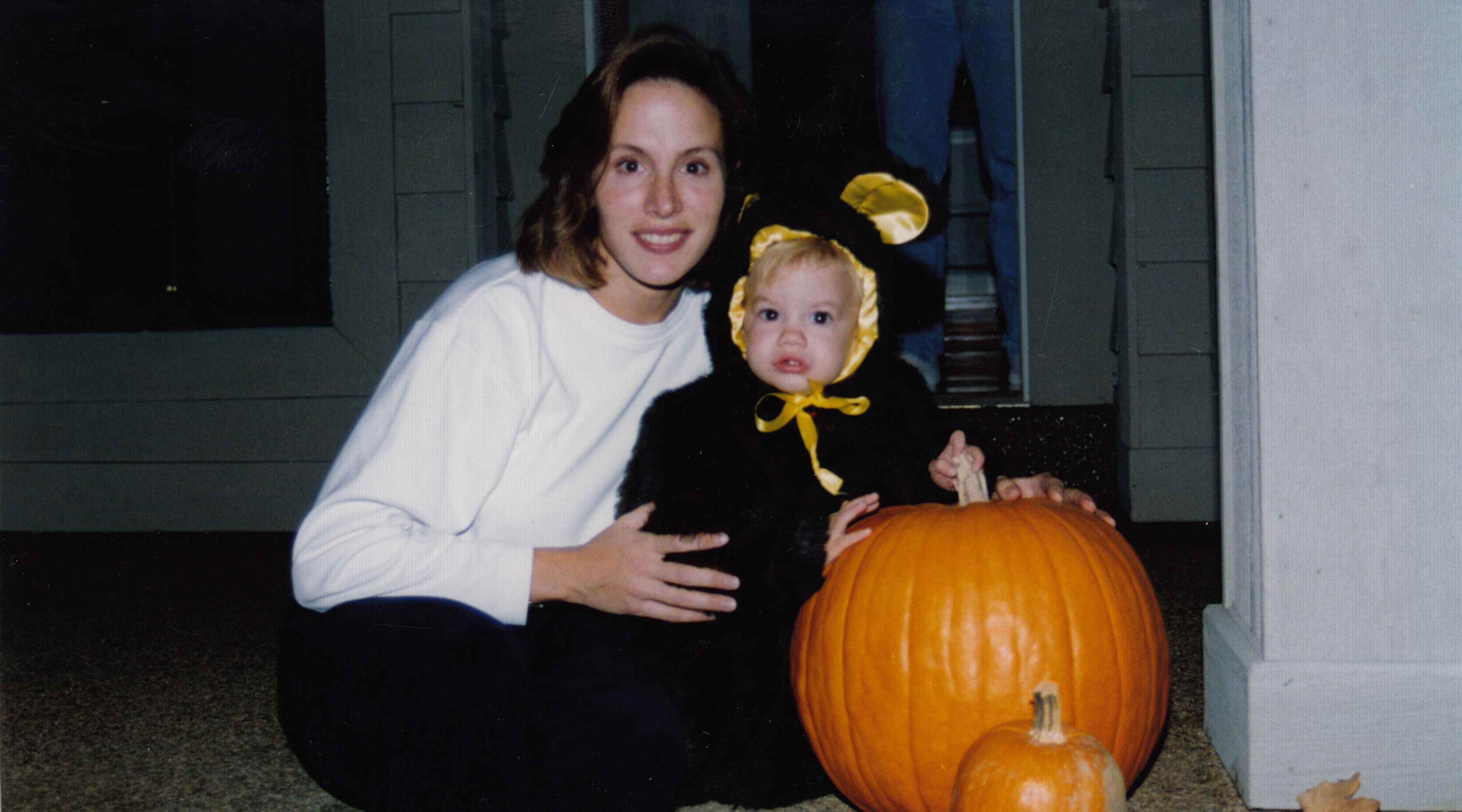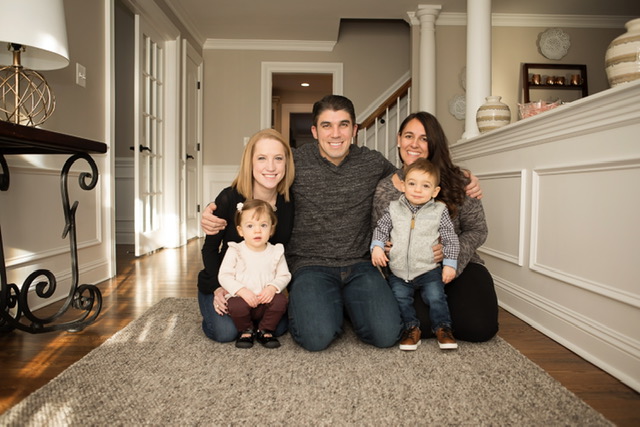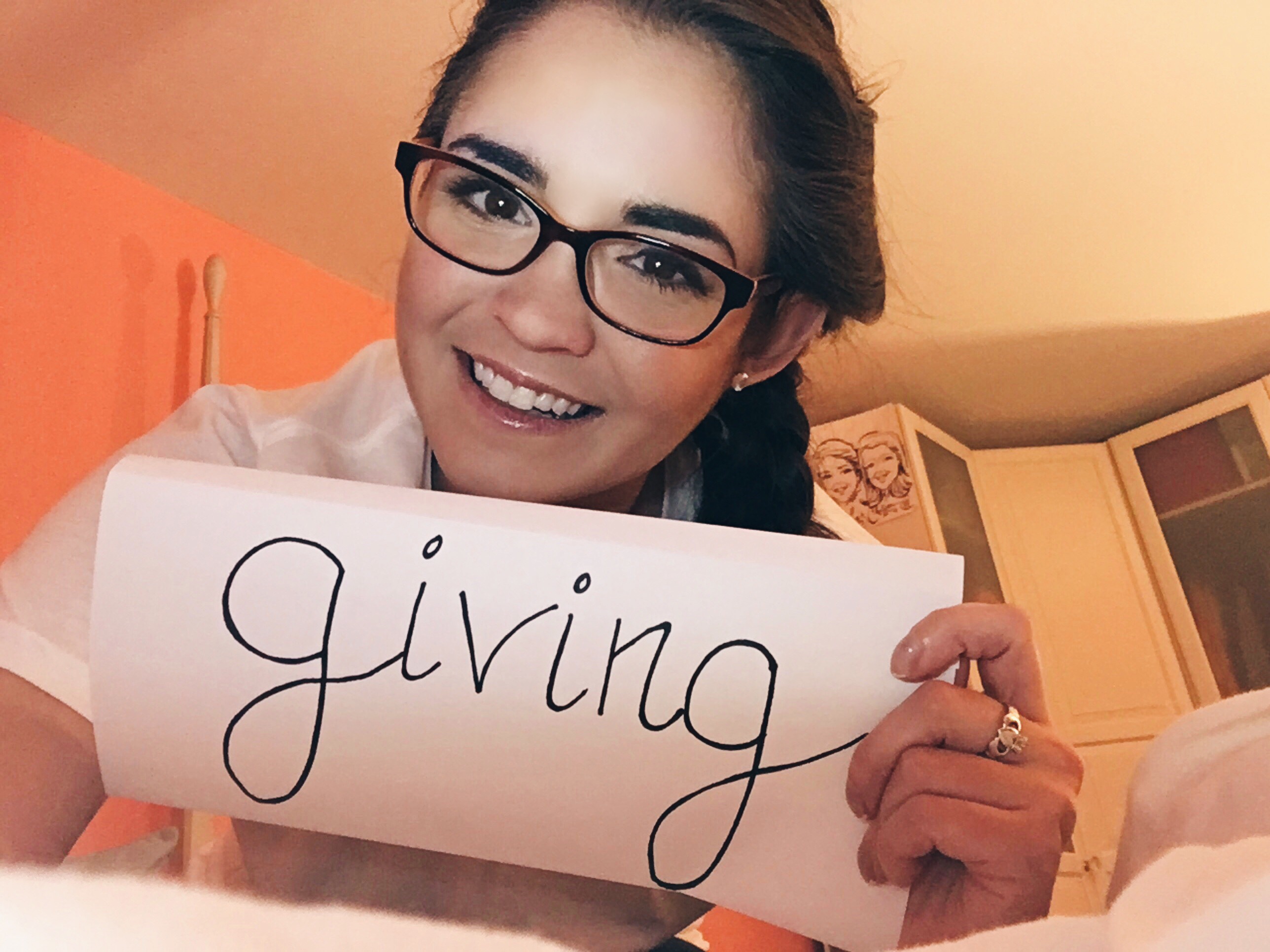Darcy is back with her guest column to chat with you about talk to kids about CF! In the spirit of Halloween, please take note of the above picture of one of my first Halloween costumes from my childhood!
This post is inspired by Megan Barker, founder of Project CF Spouse, who I was fortunate enough to meet at NACFC this past weekend! Megan, whose husband Ty has CF, shared their story at the “Adulting with CF” session and gave a voice to CF significant others (woo-hoo!).
In her talk, she pointed out an issue that many adult CF families are facing – how do you talk to your children about a parent who is sick? How do you explain treatments? What happens when children find life expectancy statistics? When do kids figure out that their friends’ Mom or Dad doesn’t do the vest? The list of questions goes on.
Gunnar and I joke that we have no idea how to explain to future children about his eating habits. Since Gunnar was always encouraged to consume as many calories as possible, snacks like soda, Nilla Wafers, and Entenmanns Donuts are still a staple of his diet. How do you explain to a little kid that Dad can eat a Snickers after breakfast, but the kids can’t? It’ll be funny referring to junk food as Daddy’s special medicine.
Either way, as a therapist who specializes in child trauma, I figured it may be useful to write recommendations on how to talk to kids about serious illness. This doesn’t just apply to children who have a parent with CF – they can be used with children who have a sibling with CF, a friend with CF, or who have CF themselves.
Of course, these guidelines are not an end-all-be-all and approaching the subject differently will not scar your children. These guidelines are what I would recommend to my own therapy clients, and I hope you find them helpful! However, I will say that it is generally accepted that talking to your kids about illness is better than not talking about it, or hiding it from your kids. You want your kids to trust that they can come to you for information, you want them to know that you are a safe place for expressing their feelings or asking questions, and you want them to feel included, not isolated. Besides, if you don’t talk to your kids, they’re going to turn to the internet for answers, regardless.
I’ll talk about different tips for talking to kids based on developmental stage, and then I’ll talk about how to broach some of the big elephant in the room topics – life expectancy, infertility in males, and lung transplant.
Tips for talking to kids, based on developmental stage
Pre-school Age– Talk to your child about cystic fibrosis by calling it cystic fibrosis (or 65 roses, or whatever you call it). If you use general words like “sick,” your young child may conflate everyday sickness (eg. a stuffy nose) with CF. Young children don’t have a great grasp on the biological function of illness. Rather, they understand illness based on observed behaviors. Feel free to point out that “Your brother coughs a lot because he has cystic fibrosis” or “The vest helps with your cystic fibrosis.” This is generally satisfying enough dialogue for pre-school aged kids and you can withhold discussing the more serious aspects of disease. Be prepared to repeat information over and over, as young kids take longer to absorb information.
Elementary School Age– At this stage of development, children may have thoughts, feelings, worries and concerns about cystic fibrosis. Additionally, these thoughts, feelings, worries, and concerns may not always be assuaged with reassurance that “everything will be ok.” The most important thing to remember with children at this age is that they may not accurately process information you are giving them. For example, you may tell your child “Germs can be extra harmful to someone with cystic fibrosis, so here is an extra hand sanitizer to bring on your field trip.” To adults, that makes total sense. To a child, that may translate to, “If I don’t keep using hand sanitizer, something bad might happen,” or “I have to make sure all my friends use hand sanitizer so I can play with them,” or “If I don’t have hand sanitizer I can’t go on field trips.” When you give information to a child about cystic fibrosis, make sure you check in with them to assess their level of understanding. For example, you may say, “Germs can be extra harmful to someone with cystic fibrosis, so I’m going to pack you an extra hand sanitizer. What do you think that means?” This way, your child is encouraged to ask questions and you can clarify any misunderstandings. It’s also important that you address the cause of CF at this age, so your child does not wonder if someone did something wrong to cause cystic fibrosis.
Middle School Age- Children of all ages rely on parents to bring security and support into otherwise chaotic lives, but middle school aged kids are the ones who will really start to push back if parents try to hide things. They may be hurt, angry, and confused if information is withheld from them. As such, this is perhaps the most important age to be open and honest with your kids. Kids at this age have developed a more solid idea of the future and can better understand more future-oriented topics, such as disease progression, male infertility, and lung transplant. They also can understand that doctor appointments, burdensome treatments, and painful medical procedures exist to make a cystic fibrosis patient healthier. Educate your child about the specifics of medications, treatments, and procedures. For example, “You inhale Tobi to fight off bad bacteria.”
High School Age- Teens generally have the same capacity as adults to understand the seriousness of an illness like cystic fibrosis, although that capacity is challenged by typical teen feelings of immortality and a yearning for independence. It’s no surprise to anyone that teens may make decisions that go against their parents’ wishes, and this applies to health as well. Be open and honest with your teenager about cystic fibrosis, and if they are the one with CF, empower them to play a role in decision making about their treatment. Also encourage teenagers to disclose a cystic fibrosis diagnosis to their friends, who may be a teenagers’ preferred support system at this time.
Tips for talking to kids about big topics
Life expectancy – Obviously, this is a difficult thing to discuss, but I have heard so many horror stories about kids finding out about life expectancy statistics on their own and suffering with the resulting shock and fear all by themselves. Gunnar, on the other hand, knew about life expectancy statistics from a very young age, by virtue of being a part of CF advocacy since age 2. It was just an accepted part of his life, and he never thought twice about it growing up. Although choosing to discuss life expectancy stats with your kids is a very personal decision, I fear that the internet might rob families of having any say in the matter. I am of the opinion that since kids start using technology at such young ages, parents should start having conversations about life expectancy statistics once their kids have access to reading the internet. You can even use technology as a starting point for conversation – “Hey, have you ever looked up cystic fibrosis on the internet? Maybe we can do it together, because there is some research on the internet that may sound scary.” Be honest with your child – “Some people with cystic fibrosis die younger than other people, but many live much longer. We go to the doctor every few months so {you} {your parent} {your sibling} {your friend} lives a long life.” Many kids, especially kids in elementary school or older, won’t be reassured by sentiments like, “Don’t worry, dying young won’t happen to you,” because anxiety likes to prey on “but what if…” Rather, encourage your child to focus on the present, and explain that you’ll tackle big issues together in the future, when you actually need to. For example, “No dying is happening today, so we won’t have to worry about dying for a very long time.” With that being said, be open to discussing life expectancy and dying if your child brings it up. If you think your child’s worries about life expectancy are getting too big, consider seeking help from your care team social worker.
Male infertility– I have also heard too many bad stories about males finding out about infertility as late as their twenties. This is another thing you don’t want a kid to find out about on the internet. You can ask a kid as young as 7, “Do you want to have kids when you grow up?” Whether the answer is yes or no, you can explain, “Most men with cystic fibrosis need help from doctors to have kids, or they adopt kids. When you’re an adult, there will be lots of people to help you have kids.” Your child might not think twice about this answer, but he won’t be blindsided when he learns about it from a doctor or from the internet when he is older.
Lung Transplant- If transplant is something far off in the future, broach the subject like you would life expectancy – “Many people with cystic fibrosis have lung transplants one day, when their lungs stop working well enough. But that is something we will deal with when that time comes.” If you are speaking to a child who has a family member on the transplant list, you can approach the topic with more specifics. Try to gauge your child’s understanding of the patient’s health – “How do you think Mom’s lungs have been doing recently?” You may be surprised at your child’s level of observation. Continue to explain, “Mom is on a waiting list to get a new pair of lungs, and we don’t know when it will happen. When it happens, Mom will be in the hospital for a long time to rest the new lungs.” Most kids will worry about what will happen to them in the absence of the person with CF, so make sure you’re prepared to tell them the plan – “When Mom gets a phone call that it’s time for new lungs, Grandma will come over right away and stay with you, so I can go to the hospital with Mom. She’ll take you to school, help you with homework, cook your dinner, and sleepover until Mom and I can come home.”
There are lots of ways you can talk to kids about cystic fibrosis. Gunnar describes the conversations he had as a child as more “gingerly and uplifting” than the more direct and candid ways I outlined above, and he turned about to be as resilient and well-adjusted as anyone. Either way, most families don’t have the ability to outrun the internet these days, so I hope these basic tips help you start the conversation! If there any other important topics of discussion that I missed, please let me know in the comments!
An edit was applied on Thursday, 10/25 at 8:30am. A technology error led to the final paragraph being omitted.





